Youth Apprenticeship
Students and youth who are 16 to 19 years of age and employed in a skilled trade while in high school may register as a youth apprentice. There is no fee to register; the only cost is for an identification card.
A registered youth apprentice can continue as a student while they work part-time getting paid, and accumulating hours and experience toward trade certification. When the youth apprentice has graduated from high school, they may continue their apprenticeship training on a full-time basis until they have completed all the required hours and training levels, and successfully pass the certification exam to become a journeyperson in the trade. Below are some frequently asked questions that will help youth better understand apprenticeship training and get started as a youth apprentice.
With apprenticeship training, the apprentice is paid by their employer while they are being trained. While most of the training and learning takes place on the job (80%), there is a classroom component (20%) where students complete their technical training.
Technical training is generally instructor-led and takes place in the classroom or online. Apprentices are not typically paid by their employer during their technical training. Some of the benefits of apprenticeship training are:
- Apprentices get paid by their employer while they learn a skilled trade.
- Apprentices learn alongside highly trained, experienced trade professionals who are already certified.
- Apprentices often finish their training with little to no student debt.
- Apprenticeship certification is recognized across Canada.
The business agreeing to sign an apprenticeship agreement MUST have one or more certified journeypersons on staff in the skilled trade for which the employer is registering the apprentice
With apprenticeship training, the apprentice is paid by their employer while they are being trained. While most of the training and learning takes place on the job (80%), there is a classroom component (20%) where students complete their technical training.
Technical training is generally instructor-led and takes place in the classroom or online. Apprentices are not typically paid by their employer during their technical training. Some of the benefits of apprenticeship training are:
- Apprentices get paid by their employer while they learn a skilled trade.
- Apprentices learn alongside highly trained, experienced trade professionals who are already certified.
- Apprentices often finish their training with little to no student debt.
- Apprenticeship certification is recognized across Canada.
The business agreeing to sign an apprenticeship agreement MUST have one or more certified journeypersons on staff in the skilled trade for which the employer is registering the apprentice
When an apprentice completes all levels of training, the required number of hours for the trade, and successfully passes the certification exam, they become a certified journeyperson. A certified journeyperson can provide training and mentorship to an apprentice.
When an apprentice completes all levels of training, the required number of hours for the trade, and successfully passes the certification exam, they become a certified journeyperson. A certified journeyperson can provide training and mentorship to an apprentice.
An Industry Training Consultant is a staff of the Nova Scotia Apprenticeship Agency. When an apprenticeship agreement is signed, an Industry Training Consultant (ITC) is assigned to the employer and apprentice to support them throughout the apprentices learning journey. An apprentice will be assigned to an ITC based on their region of employment and trade.
An Industry Training Consultant is a staff of the Nova Scotia Apprenticeship Agency. When an apprenticeship agreement is signed, an Industry Training Consultant (ITC) is assigned to the employer and apprentice to support them throughout the apprentices learning journey. An apprentice will be assigned to an ITC based on their region of employment and trade.
An apprenticeship agreement is a written or electronic agreement involving the Nova Scotia Apprenticeship Agency, the apprentice (student) and the employer. The apprenticeship agreement confirms that the employer will employ the apprentice and provide them with practical (on-the-job) experience and the opportunity to attend technical training. The apprentice agrees to learn the work of the trade from the employer and attend technical training. To become a registered (youth) apprentice, the student must sign an apprenticeship agreement with their employer.
Next, the student will need to register their apprenticeship agreement. This is done through the Nova Scotia Apprenticeship Agency. As of January 8th, all applications for apprentices have been migrated to our new Apprenticeship Management System (AMS). To set up your new Apprenticeship Management System account and to apply for apprenticeship, follow the instructions here.
If you experience any difficulties accessing Apprenticeship Management System, please contact the Nova Scotia Apprenticeship Agency's General Inquiries line.
Any supporting documentation, such as proof of training and previous work experience, can be mailed, dropped off, or scanned and emailed to your assigned Industry Training Consultant.
To access the registration form, select:
- Apprenticeship Registration Forms (Option 1)
- Apprenticeship Registration Form and Process to Work in Nova Scotia (Option 1)
- Select ‘Submit Online’
- Submit the completed form online.
Next Steps: Once the completed apprenticeship agreement form has been submitted to the Nova Scotia Apprenticeship Agency, the student will receive an email confirming receipt of their application. The agreement will be assigned to an Industry Training Consultant (ITC). The ITC will connect with the student/employer once their agreement has been received.
- Time frame: It may take up to 2 to 4 weeks after submitting an agreement application before the ITC connects with the student/employer.
Once the ITC has connected with the student/employer, the agreement will be registered. The apprentice will be mailed their logbook and an identification card.
- Time frame: It will take 2 to 4 weeks to receive the logbook and 4 to 6 weeks to receive the ID card. If it has been longer than 6 weeks, please inform your ITC.
An apprenticeship agreement is a written or electronic agreement involving the Nova Scotia Apprenticeship Agency, the apprentice (student) and the employer. The apprenticeship agreement confirms that the employer will employ the apprentice and provide them with practical (on-the-job) experience and the opportunity to attend technical training. The apprentice agrees to learn the work of the trade from the employer and attend technical training. To become a registered (youth) apprentice, the student must sign an apprenticeship agreement with their employer.
Next, the student will need to register their apprenticeship agreement. This is done through the Nova Scotia Apprenticeship Agency. As of January 8th, all applications for apprentices have been migrated to our new Apprenticeship Management System (AMS). To set up your new Apprenticeship Management System account and to apply for apprenticeship, follow the instructions here.
If you experience any difficulties accessing Apprenticeship Management System, please contact the Nova Scotia Apprenticeship Agency's General Inquiries line.
Any supporting documentation, such as proof of training and previous work experience, can be mailed, dropped off, or scanned and emailed to your assigned Industry Training Consultant.
To access the registration form, select:
- Apprenticeship Registration Forms (Option 1)
- Apprenticeship Registration Form and Process to Work in Nova Scotia (Option 1)
- Select ‘Submit Online’
- Submit the completed form online.
Next Steps: Once the completed apprenticeship agreement form has been submitted to the Nova Scotia Apprenticeship Agency, the student will receive an email confirming receipt of their application. The agreement will be assigned to an Industry Training Consultant (ITC). The ITC will connect with the student/employer once their agreement has been received.
- Time frame: It may take up to 2 to 4 weeks after submitting an agreement application before the ITC connects with the student/employer.
Once the ITC has connected with the student/employer, the agreement will be registered. The apprentice will be mailed their logbook and an identification card.
- Time frame: It will take 2 to 4 weeks to receive the logbook and 4 to 6 weeks to receive the ID card. If it has been longer than 6 weeks, please inform your ITC.
For support navigating youth apprenticeship, contact the Manager, Youth and Equity Programs at Labour Skills and Immigration.
For support navigating youth apprenticeship, contact the Manager, Youth and Equity Programs at Labour Skills and Immigration.
High School Opportunities: Explore Opportunities in the Skilled Trades
Youth apprenticeship is promoted through an initiative called Workit. Workit Youth Apprenticeship provides youth with an opportunity to explore a designated trade, and actively encourages youth to experience the trades through community-based learning options in the public school system, such as co-operative education placements and Options and Opportunities (O2). Youth who participate in these activities are eligible to receive apprenticeship credit leading to future apprenticeship certification. Learn more below.
Here are some frequently asked questions that will help youth better understand apprenticeship training and get started as a youth apprentice.
Co-operative Education and Options & Opportunities (O2)
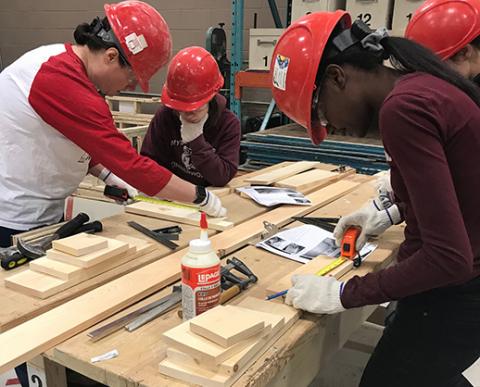
These programs provide students in the public school system the opportunity to engage in in-depth career exploration through their course work. A required component of these programs/courses is that students will gain experience on the job in a variety of occupations. If a student completes their co-op work term under the supervision of a certified journeyperson, they qualify to claim 100 hours of apprenticeship practical credit toward certification. For more information, visit the NS Department of Education and Early Childhood Development pages below.
Co-operative Education and Options & Opportunities (O2)

These programs provide students in the public school system the opportunity to engage in in-depth career exploration through their course work. A required component of these programs/courses is that students will gain experience on the job in a variety of occupations. If a student completes their co-op work term under the supervision of a certified journeyperson, they qualify to claim 100 hours of apprenticeship practical credit toward certification. For more information, visit the NS Department of Education and Early Childhood Development pages below.
Skilled Trades Courses
Skilled Trades courses are the starting point for Nova Scotia high school students who want to explore the skilled trades as a possible career option. These courses are based on curricula that immerse students in the realities of skilled trades work. Skilled Trades courses are designed to be taught by certified journeypersons. As the result of an agreement between the Nova Scotia Department of Education and Early Childhood Development, and the Nova Scotia Apprenticeship Agency, students receive up to 110 apprenticeship practical hours, upon registration as an apprentice, based on the actual time in class while under the supervision of a certified journeyperson teacher. For more information, visit the NS Department of Education and Early Childhood Development page below.
Youth employed with a skilled trade employer
A student seeking an apprenticeship will need to confirm with their employer that the business is willing to register the student as an apprentice by signing and fulfilling the terms of an apprenticeship agreement.
Here is the registration form.
Youth employed not yet employed with a skilled trade employer
A student must be employed with a skilled trades business before they can register as an apprentice. It is the responsibility of the student to work with potential employers to find the right employment opportunity.
If a student is not already connected to a skilled trades business through family, friends, neighbours, cooperative education experiences, etc. it is suggested that the student connect with their local Nova Scotia Works office. The following job sites can also be monitored for skilled trades related employment:
Once employment has been confirmed, and the employer agrees to enter into an apprenticeship agreement with the student, that agreement can be registered with the Apprenticeship Agency.
Pre-Apprenticeship refers to opportunities for high school students to engage in skilled trades employment exploration without the commitment of signing an apprenticeship agreement. Under certain circumstances, participation in pre-apprenticeship opportunities will earn hours that can be credited to a future apprenticeship agreement.
Please note: Only students who register their apprenticeship agreement with an employer through the Nova Scotia Apprenticeship Agency are considered (youth) apprentices. Participation in pre-apprenticeship opportunities does not result in automatic registration as an apprentice. Alternatively, students do not need to participate in a pre-apprenticeship opportunity to register as a (youth) apprentice.
Pre-Apprenticeship in High School
The following high school courses provide pre-apprenticeship engagement opportunities, and can earn students credit hours towards an apprenticeship agreement:
- Skilled Trades – 110 Credit Hours
- Co-op – 100 Credit Hours *For placements with a skilled trades business
- O2 – 100 Credit Hours
The class instructor and Co-op placement mentor MUST be a certified journeyperson for the credit hours to be applicable.
Pre-Apprenticeship Summer Employment
Three pre-apprenticeship summer employment opportunities exist for grades 10 and 11 students in Co-op and O2 programs:
- Building Futures for Youth
- Serve it Up!
- TestDrive
Successful completion of the 200-hour work placement with their assigned skilled trades business will earn students 300 credit hours.
Please Note: The above listed high school courses and summer employment opportunities can be combined to earn students a MAXIMUM of 500 credit hours towards a future apprenticeship agreement.
Claiming Credit Hours:
Students MUST be able to prove that they have completed course and program requirements before credit hours can be claimed.
For high school courses, completed placements logs and logbooks that contain the supervising journeypersons name and Certificate of Qualification number is sufficient to claim earned credit hours.
For the summer employment opportunities, the certificate of participation, issued by the program for which the student participated in, will be required.
To claim credit hours, digital copies of certificates of completion, relevant training and participation certificates, along with placement logs and course logbooks can be submitted online with the application to register as a (youth) apprentice. Physical copies can be shown to the assigned Industry Training Consultant. The Industry Training Consultant will award earned credit hours as part of the registration process for the apprenticeship application.
Pre-Apprenticeship in High School
The following high school courses provide pre-apprenticeship engagement opportunities, and can earn students credit hours towards an apprenticeship agreement:
- Skilled Trades – 110 Credit Hours
- Co-op – 100 Credit Hours *For placements with a skilled trades business
- O2 – 100 Credit Hours
The class instructor and Co-op placement mentor MUST be a certified journeyperson for the credit hours to be applicable.
Pre-Apprenticeship Summer Employment
Three pre-apprenticeship summer employment opportunities exist for grades 10 and 11 students in Co-op and O2 programs:
- Building Futures for Youth
- Serve it Up!
- TestDrive
Successful completion of the 200-hour work placement with their assigned skilled trades business will earn students 300 credit hours.
Please Note: The above listed high school courses and summer employment opportunities can be combined to earn students a MAXIMUM of 500 credit hours towards a future apprenticeship agreement.
Claiming Credit Hours:
Students MUST be able to prove that they have completed course and program requirements before credit hours can be claimed.
For high school courses, completed placements logs and logbooks that contain the supervising journeypersons name and Certificate of Qualification number is sufficient to claim earned credit hours.
For the summer employment opportunities, the certificate of participation, issued by the program for which the student participated in, will be required.
To claim credit hours, digital copies of certificates of completion, relevant training and participation certificates, along with placement logs and course logbooks can be submitted online with the application to register as a (youth) apprentice. Physical copies can be shown to the assigned Industry Training Consultant. The Industry Training Consultant will award earned credit hours as part of the registration process for the apprenticeship application.
Summer Youth Programs
The Nova Scotia Apprenticeship Agency works with industry and equity-deserving groups to help promote skilled trades opportunities to youth. This includes the delivery of summer youth programs.
These programs provide students in grades 10 and 11 who are in the Options and Opportunities and Co-op programs the opportunity to earn hours toward an apprenticeship and high school credits through 5 to 7-week on-the-job paid work terms. The programs are funded and supported by the Nova Scotia Apprenticeship Agency and participating employers. They are led by industry associations and offered in partnership with the Department of Education and Early Childhood Development and Regional Centres for Education.
Test Drive, Automotive Apprenticeship
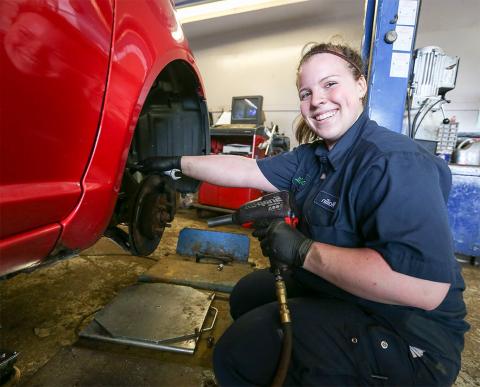
TestDrive gives students an opportunity to explore skilled trade careers in the motive power sector. Led by the Automotive Sector Council of Nova Scotia with funding from NSAA, TestDrive is available in targeted geographic areas of the province where workforce demands are highest. NSCC delivers workplace safety and industry training for students before they start their paid summer work terms. For completing this summer program, students receive 300 hours of apprenticeship practical credit as well as earning three high school co-op credits.
Test Drive, Automotive Apprenticeship

TestDrive gives students an opportunity to explore skilled trade careers in the motive power sector. Led by the Automotive Sector Council of Nova Scotia with funding from NSAA, TestDrive is available in targeted geographic areas of the province where workforce demands are highest. NSCC delivers workplace safety and industry training for students before they start their paid summer work terms. For completing this summer program, students receive 300 hours of apprenticeship practical credit as well as earning three high school co-op credits.
Building Futures for Youth

Building Futures for Youth enables students to explore skilled trade careers in Nova Scotia’s construction industry. Led by the Construction Association of Nova Scotia with funding from NSAA, Building Futures for Youth is available in all Nova Scotia Regional Centres for Education and Conseil Scolaire Acadien Provincial. NSCC and the Construction Safety Association deliver workplace safety and industry training for students before they start their paid summer work terms. For completing this summer program, students receive 300 hours of apprenticeship practical credit as well as earning 3 high school co-op credits.
Building Futures for Youth

Building Futures for Youth enables students to explore skilled trade careers in Nova Scotia’s construction industry. Led by the Construction Association of Nova Scotia with funding from NSAA, Building Futures for Youth is available in all Nova Scotia Regional Centres for Education and Conseil Scolaire Acadien Provincial. NSCC and the Construction Safety Association deliver workplace safety and industry training for students before they start their paid summer work terms. For completing this summer program, students receive 300 hours of apprenticeship practical credit as well as earning 3 high school co-op credits.
Serve it Up!
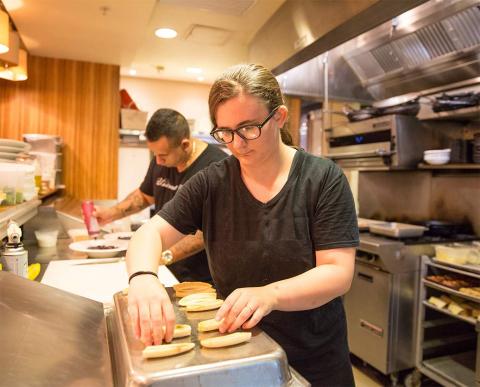
Serve it Up! enables students to work alongside a Red Seal certified Cook for practical, hands-on job experience in the culinary industry. Led by the Nova Scotia Tourism Human Resources Sector Council with funding from NSAA, Serve it Up! is available to grades 10 and 11 students in targeted geographic areas of the province where workforce demands are highest. Students receive workplace safety and industry training before they start their paid summer work terms. For completing this summer program, students receive 300 hours of apprenticeship practical credit as well as earning 3 high school co-op credits.
Serve it Up!

Serve it Up! enables students to work alongside a Red Seal certified Cook for practical, hands-on job experience in the culinary industry. Led by the Nova Scotia Tourism Human Resources Sector Council with funding from NSAA, Serve it Up! is available to grades 10 and 11 students in targeted geographic areas of the province where workforce demands are highest. Students receive workplace safety and industry training before they start their paid summer work terms. For completing this summer program, students receive 300 hours of apprenticeship practical credit as well as earning 3 high school co-op credits.
Summer Camps

The Nova Scotia Apprenticeship Agency works with many organizations to provide experiential learning opportunities throughout the summer. These summer camps connect youth with trades-focused activities allowing them to explore careers within trades in a fun and interactive way. Interested in participating in a summer camp? Contact the Manager, Youth and Equity Programs at Labour Skills and Immigration.
Summer Camps

The Nova Scotia Apprenticeship Agency works with many organizations to provide experiential learning opportunities throughout the summer. These summer camps connect youth with trades-focused activities allowing them to explore careers within trades in a fun and interactive way. Interested in participating in a summer camp? Contact the Manager, Youth and Equity Programs at Labour Skills and Immigration.
‘Hands-on’ Career Exploration
The Nova Scotia Apprenticeship Agency works with industry leaders to provide opportunities for youth to learn about and try skilled trade careers. Learn about some of the career exploration opportunities that are available to youth through our partner organizations below.
Trades Exhibition Hall
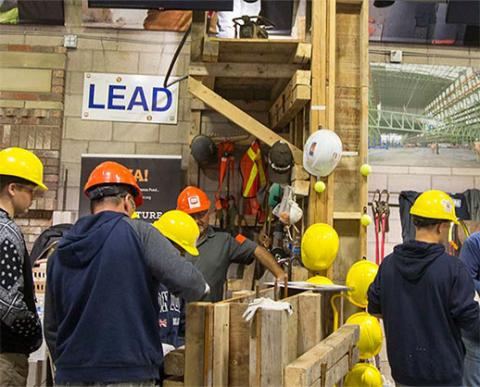
The Trades Exhibition Hall is a one-of-a-kind facility operated by the Nova Scotia Construction Sector Council (NSCSC) that hosts participants to explore the tasks of 15 different construction trades in a hands-on way. Booths are staffed by tradespersons who can guide participants through activities that allow them to understand what to expect in the trade and how to become certified.
The Mobile Construction Experience, operated by the NSCSC, was created to support youth especially in rural areas to engage in the activities of the Trades Hall without the requirement to travel to Halifax for it. A transport trailer was purpose-built to showcase ten different Construction Trades to engage rural communities in the same hands-on activities they would experience in the Trades Exhibition Hall.
Trades Exhibition Hall

The Trades Exhibition Hall is a one-of-a-kind facility operated by the Nova Scotia Construction Sector Council (NSCSC) that hosts participants to explore the tasks of 15 different construction trades in a hands-on way. Booths are staffed by tradespersons who can guide participants through activities that allow them to understand what to expect in the trade and how to become certified.
The Mobile Construction Experience, operated by the NSCSC, was created to support youth especially in rural areas to engage in the activities of the Trades Hall without the requirement to travel to Halifax for it. A transport trailer was purpose-built to showcase ten different Construction Trades to engage rural communities in the same hands-on activities they would experience in the Trades Exhibition Hall.
Techsploration
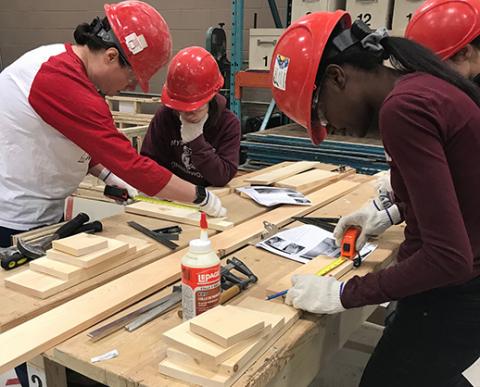
Techsploration supports the career exploration and empowerment of young women in career areas where women remain underrepresented. Grade 9 girls meet and partner with mentors working in science, trade, technology, or engineering careers. Through participation in multiple events from grade 9 through to graduation, Techsplorers can meet and hear from hundreds of female mentors.
Techsploration

Techsploration supports the career exploration and empowerment of young women in career areas where women remain underrepresented. Grade 9 girls meet and partner with mentors working in science, trade, technology, or engineering careers. Through participation in multiple events from grade 9 through to graduation, Techsplorers can meet and hear from hundreds of female mentors.
Nova Scotia Skills Competition
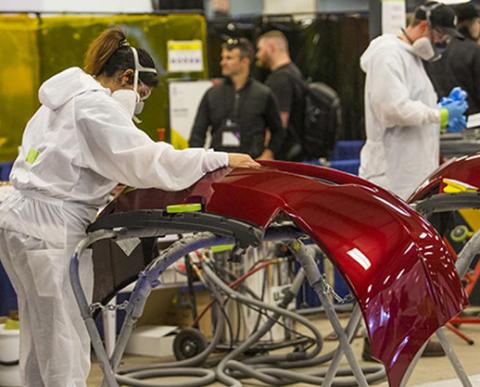
Skills Canada Nova Scotia (SCNS) provides opportunities for youth to explore skilled trades and technologies through a range of programs.
Showcase your talent at the Nova Scotia Skills Competition!
Every spring, SCNS hosts a provincial competition where youth and apprentices can showcase their skills and compete against others in their contest area for a chance to advance to the National competition level. During the provincial competition, approximately 300 youth compete in 45 skilled trades/technologies throughout the province.
Nova Scotia Skills Competition

Skills Canada Nova Scotia (SCNS) provides opportunities for youth to explore skilled trades and technologies through a range of programs.
Showcase your talent at the Nova Scotia Skills Competition!
Every spring, SCNS hosts a provincial competition where youth and apprentices can showcase their skills and compete against others in their contest area for a chance to advance to the National competition level. During the provincial competition, approximately 300 youth compete in 45 skilled trades/technologies throughout the province.
Bricklayer
Meet two Bricklayers who explain the Red Seal trade and the apprenticeship pathway.
Cook
Meet a Cook who explains the Red Seal trade and the apprenticeship pathway.
Heavy Duty Equipment Technician
Meet a Heavy Duty Equipment Technician who explains the Red Seal trade and the apprenticeship pathway.
Machinist
Meet a Machinist who explains the Red Seal trade and the apprenticeship pathway.


